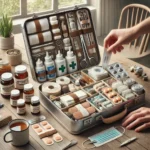Infections can turn a minor scrape into a serious problem, especially when you’re off-grid without easy access to medical care. But don’t worry! With the right knowledge and tools, you can identify, treat, and even prevent infections in a self-reliant way. Let’s dive into practical tips that every off-grid enthusiast should know.
Recognizing the Signs of Infections
The key to managing infections is early identification. Here’s what to look for:
- Redness and Swelling
Infected wounds often become red, swollen, and warm to the touch. These signs indicate inflammation. - Pain or Tenderness
Increasing pain around a wound could mean the infection is spreading. - Pus or Discharge
Yellow or green pus is a clear sign your body is fighting bacteria. - Fever and Fatigue
If the infection spreads, it may cause systemic symptoms like fever, chills, or extreme tiredness. - Streaking or Swelling of Lymph Nodes
Red streaks leading away from the wound or swollen lymph nodes could indicate the infection has entered the bloodstream. This is a medical emergency.
Treating Infections Off-Grid
Once you spot an infection, acting quickly is critical. Here’s a step-by-step guide to treatment:
1. Clean the Wound Thoroughly
- Irrigate the Area: Use clean, boiled water or a saline solution to flush out dirt and bacteria. Avoid scrubbing, which can worsen tissue damage.
- Disinfect: Apply an antiseptic like iodine, hydrogen peroxide, or alcohol. If none are available, a saltwater solution works in a pinch.
2. Remove Dead Tissue
Carefully trim away any dead skin or tissue around the wound. This prevents bacteria from spreading further. Sterilize tools by boiling them or heating them in a flame.
3. Apply Natural Antibiotics
Nature provides some incredible remedies for infections:
- Honey: Raw honey has antibacterial properties and can be applied directly to wounds.
- Garlic: Crush fresh garlic into a paste and apply it to the wound. Its allicin content fights bacteria.
- Tea Tree Oil: Dilute tea tree oil with water or carrier oil before applying to avoid skin irritation.
4. Cover the Wound
Use a clean, breathable bandage to protect the area. Change the dressing daily, or sooner if it becomes wet or dirty.
5. Monitor Progress
Keep an eye on the wound. If redness, swelling, or discharge worsens, the infection may require stronger treatment.
When to Seek Advanced Care
Sometimes, off-grid solutions aren’t enough, and advanced care is necessary:
- High Fever or Chills
- Rapidly Spreading Redness
- Uncontrollable Pain
- Streaking or Swelling of Lymph Nodes
In these cases, finding antibiotics or heading to the nearest medical facility could save a life.
Preventing Infections in the First Place
Prevention is always better than treatment. Here are some essential practices for staying infection-free off-grid:
Practice Good Hygiene
Clean hands and tools are critical when dealing with wounds. Pack hand sanitizer or soap in your kit.
Build a First-Aid Kit
Stock your kit with essentials like antiseptics, sterile bandages, tweezers, and antibiotic ointments. Adding natural remedies like honey and garlic ensures you’re prepared.
Stay Up to Date on Skills
Learn basic wound care, CPR, and infection management through survival courses or first-aid certifications.
Strengthen Your Immune System
A healthy body fights infections better. Stay hydrated, eat nutrient-rich foods, and get plenty of rest.
Natural Antibiotics for Infection Control
Off-grid living means relying on what’s around you. Here are a few more natural remedies to add to your toolkit:
- Echinacea
Boosts the immune system and helps fight off infections. Make it into a tea or tincture. - Oregano Oil
Packed with antibacterial properties, oregano oil can be diluted and applied topically or taken orally. - Turmeric
Its active ingredient, curcumin, reduces inflammation and fights bacteria. Create a paste with water or honey for wound application. - Onion Poultice
Onions draw out infection when mashed and applied to the skin. Wrap in cloth before use.
Infections can be serious, but with the right knowledge, you’re well-equipped to handle them off-grid. From recognizing the symptoms to applying effective treatments, staying prepared is key. Always carry a well-stocked first-aid kit, brush up on your wound-care skills, and remember to trust nature’s medicine cabinet when you’re far from modern healthcare.



